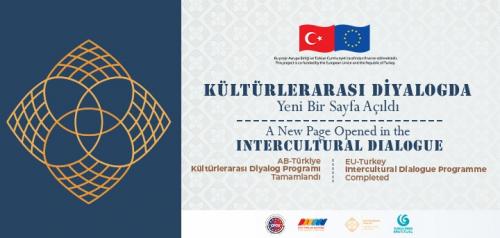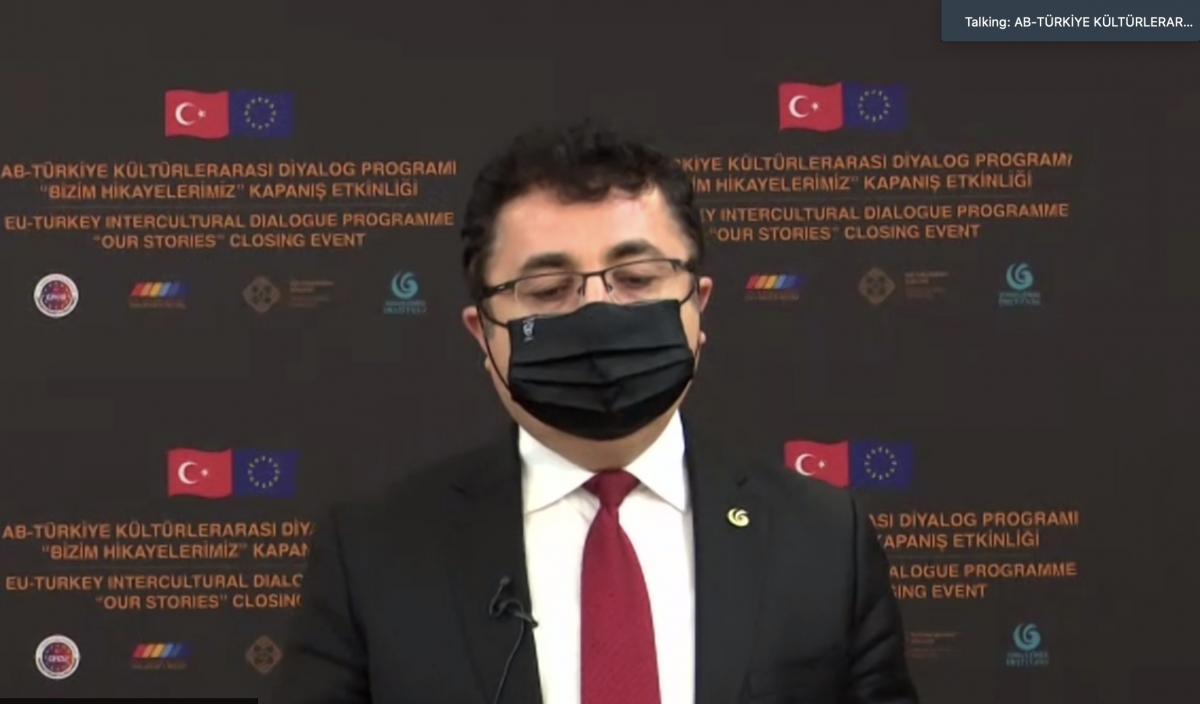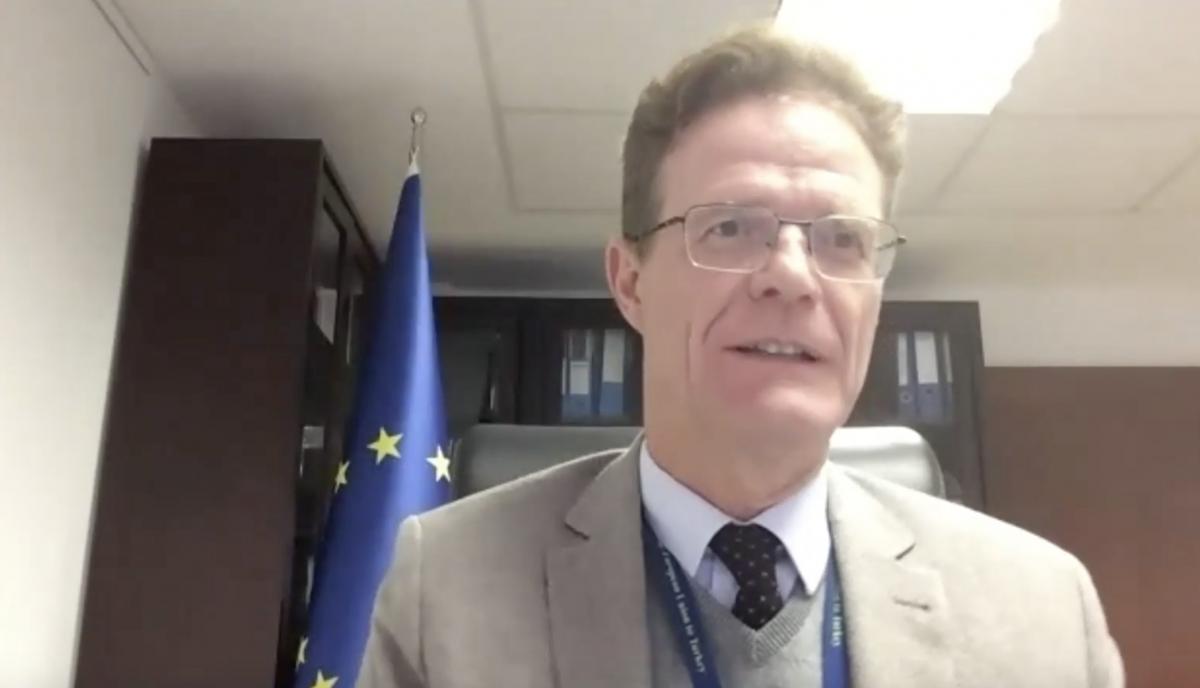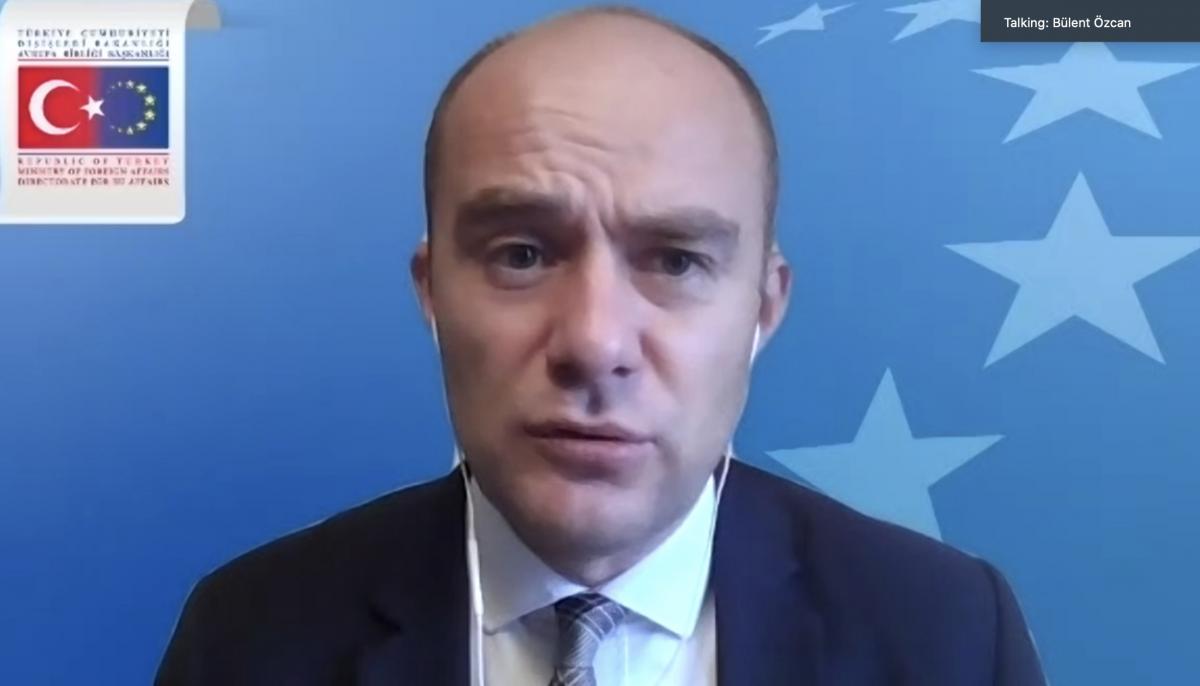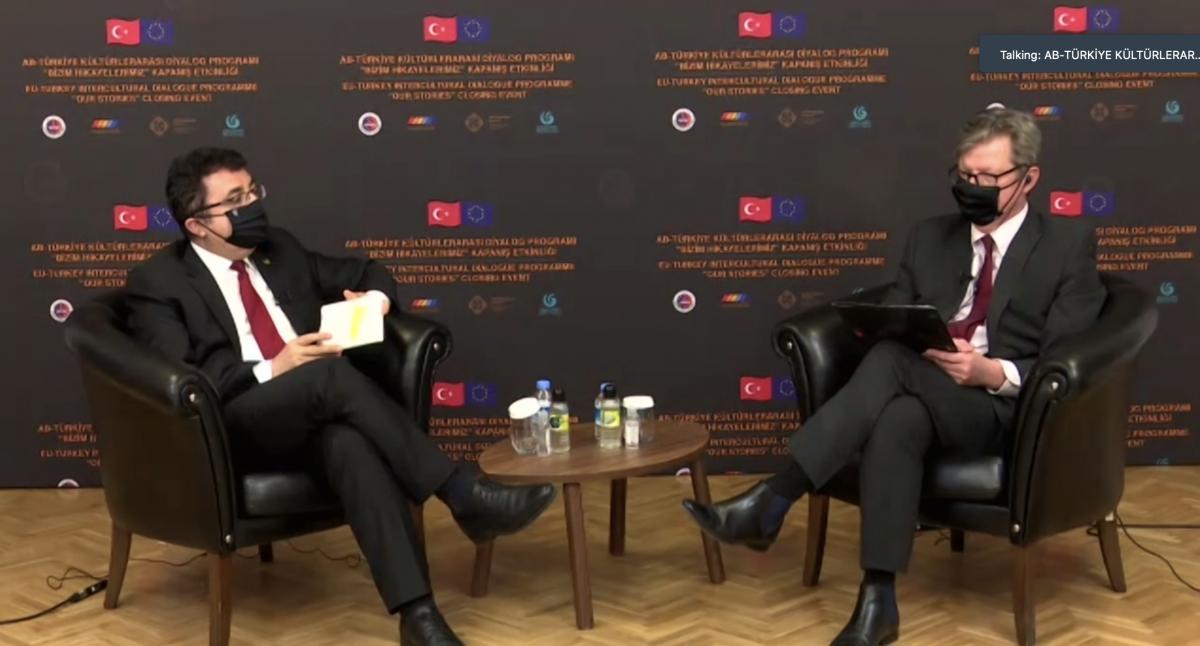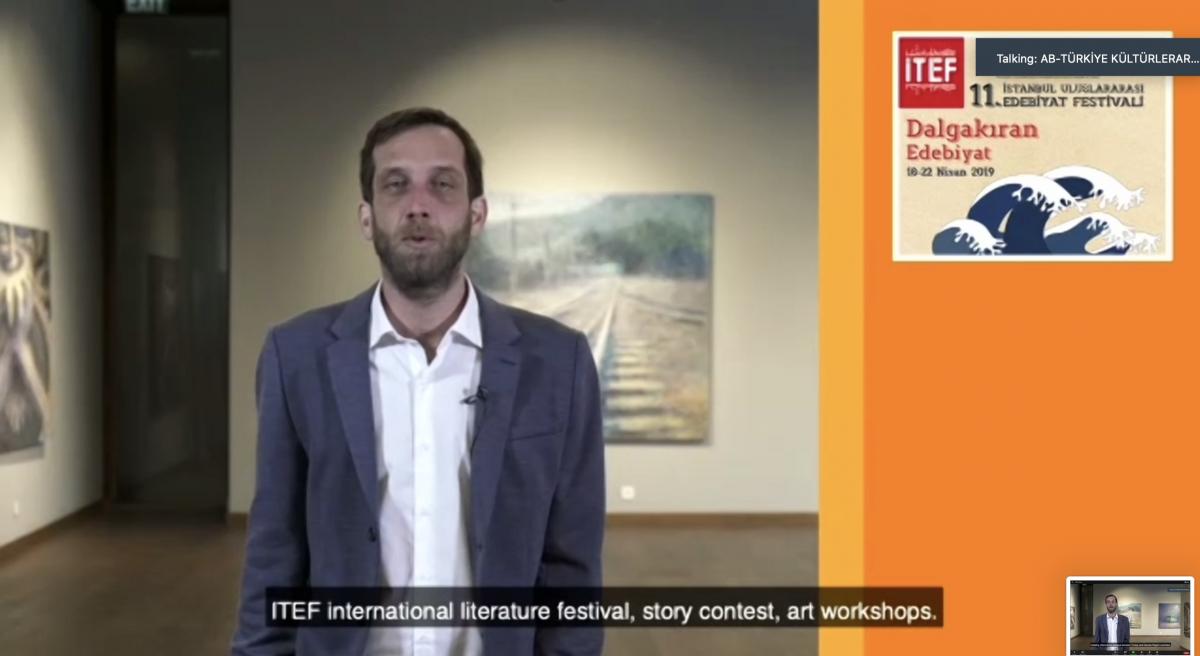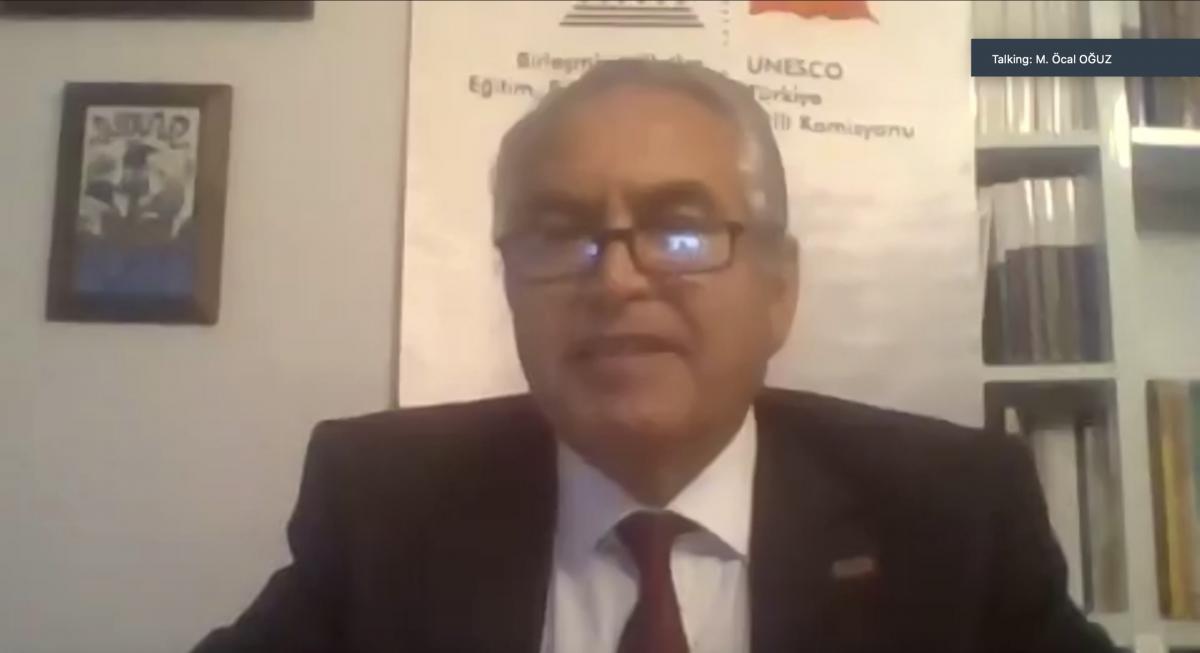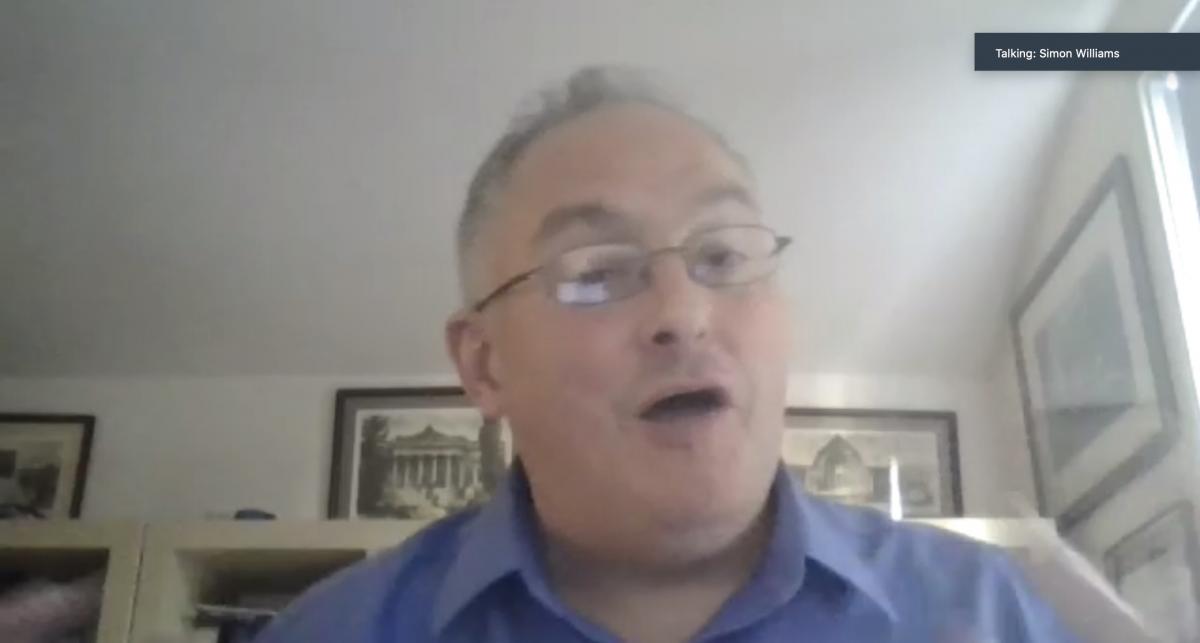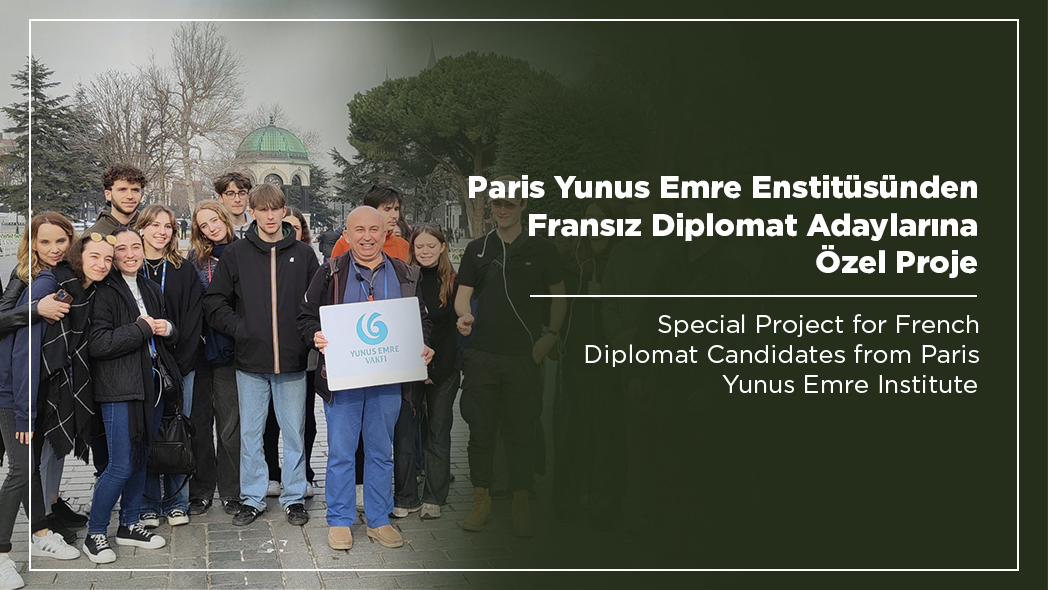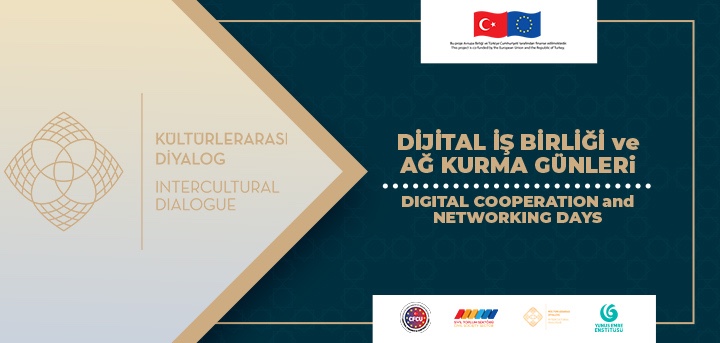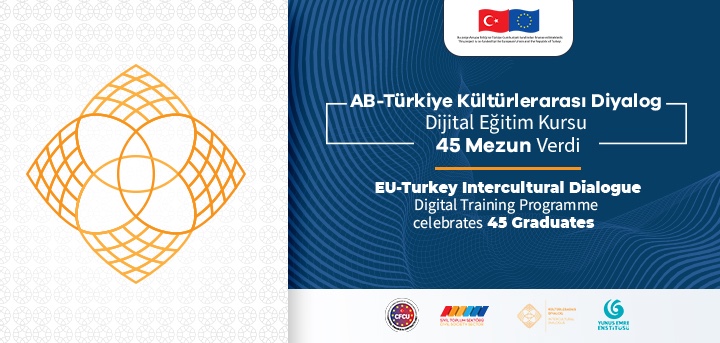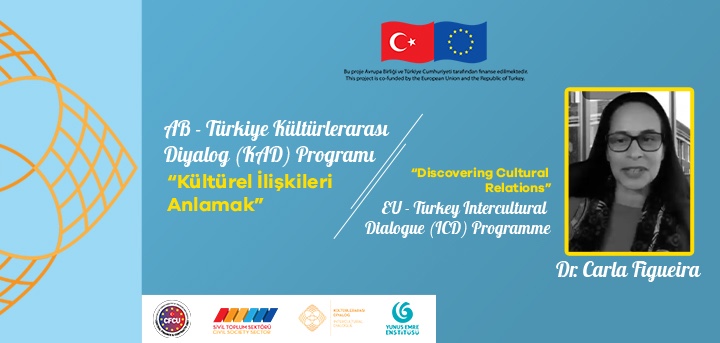A New Page Opened in the Intercultural Dialogue
The EU-Turkey Intercultural Dialogue Program run by Yunus Emre Institute and co-financed by the European Union (EU) and the Republic of Turkey is completed. During the closing ceremony of the program held on Tuesday, December 15, the projects and activities realized in 12 countries and 41 cities were covered. During the event, not only program achievements were tabled but also the horizon the program drew for participants was discussed.
The EU-Turkey Intercultural Dialogue Program (IDP) was launched in January 2019 to establish a strong dialogue between Europe and Turkey. The funds provided under the program enabled four major projects and hundreds of events organized under these projects. The program aimed at taking concrete steps forward in terms of intercultural dialogue between the EU countries and Turkey and was led by Yunus Emre Institute (YEI), which has been working for 10 years at its 60 cultural centers in 50 countries in order to promote Turkey abroad and strengthen cultural dialogue with various communities.
The closing meeting was held on Tuesday, December 15 on a digital platform due to the pandemic. The closing program started with the welcome speech by Bülent Üçpunar, Head of Strategy Development and Corporate Communications at Yunus Emre Institute. Üçpunar stated that intercultural dialogue had a major place in the work of YEI, and that they developed new partnerships and collaborations while running the program. "The essence of the activities by Yunus Emre Institute is to increase the number of people who are friends with Turkey and who bonds with Turkey, as we put it very nicely in our mission statement. In other words, in terms of its fields of activity, the Institute intends to improve cultural exchange between Turkey and other countries and to improve intercultural dialogue."
ÜÇPUNAR: INTERCULTURAL DIALOGUE IS A NATURAL PROCESS IN LIFE
|
Bülent Üçpunar, Director of Department of Strategy Development and Corporate Communication at Yunus Emre Institute |
Üçpunar emphasized that intercultural dialogue referred to a very strong and natural process that inherently existed in many aspects of life. "An attempt to come up with an inventory of the past and present of cultural interactions between Turkey and any country would possibly take decades. There is a natural exchange in almost every aspect of life from cuisine to music, and literature to architecture. When we look at the interaction around coffee and house building culture only, we can easily see what an enormous natural process we are talking about. This exchange takes place as a natural process or necessity of life, and not through superstructures such as alliance, dialogue, conflict, harmony or integration, as is often discussed around institutional structures like ours.
EXPRESSING OURSELVES AND UNDERSTANDING CORRECTLY
Bülent Üçpunar: we see intercultural dialogue as a means of expressing ourselves and understanding others correctly. |
Üçpunar quoted the famous Folk Poet Yunus Emre, the namesake of the Institute, who said, “There is another myself inside myself.” Üçpunar spoke as follows: “These selves are in an indefinite and unlimited unity, exchange and interaction. This is the perspective Yunus Emre takes in terms of cultural diplomacy and cultural relations, or the 'Intercultural Dialogue' as in the name of our program that brings us together today. He tries to shape his practice in line with this perspective. From this point of view, we see intercultural dialogue as a means of expressing ourselves and understanding others correctly."
YUNUS EMRE SAYS "COME, LET US ALL BE FRIENDS" AND REGENERATES HOPES
“The work to be carried out from the perspective of Yunus Emre who said "Come, let us all be friends", coupled with the rich cultural heritage and today's cultural productions, offers key opportunities to remedy various global problems such as xenophobia, climate change, consumption frenzy and loneliness, which are trying to seize our world.” |
Reciting Yunus Emre's lines "Come, let us all be friends", Üçpunar said, "The work to be carried out from this perspective, coupled with the rich cultural heritage and today's cultural productions, offers key opportunities to remedy various global problems such as xenophobia, climate change, consumption frenzy and loneliness, which are trying to seize our world."
Expressing his delight for the successful completion of the EU-Turkey ICD Program, Üçpunar thanked particularly the European Union Presidency of the Ministry of Foreign Affairs as well as the Central Finance and Contracts Unit, the European Union Delegation to Turkey, EUNIC Global, the European Union's cultural institutes in Turkey and EUNIC clusters for their support in the program's concept, call, success, implementation and reporting processes.
LANDRUT: THE PROGRAM ENCOURAGED MUTUAL LEARNING AND MUTUAL PRODUCTION
Ambassador Nikolaus Meyer Landrut, Head of the European Union Delegation to Turkey: Programme encouraged mutual learning and mutual production. |
Ambassador Nikolaus Meyer Landrut, Head of the European Union Delegation to Turkey, which is the main funder of the Program, delivered an opening speech and highlighted the role and importance of intercultural dialogue in EU-Turkey relations. Landrut played a key role in designing the program and has conducted Turkey's relations with the European Union. He said the EU-Turkey Intercultural Dialogue program reinforced the sense of belonging to the same European community.
|
Ambassador Nikolaus Meyer Landrut, Head of the European Union Delegation to Turkey |
Ambassador Landrut noted that despite the pandemic, numerous events were organized under the program and that more than 7 million Europeans were reached through television, radio and social media in 8 different languages. Stating that the program encouraged mobility, mutual learning and mutual production, Landrut said that was the way the creative industry developed and that all those served the economic development of the countries. Landrut also highlighted that the program created opportunities for cultural exchange by encouraging the establishment of networks. He emphasized the importance of the bridging function of culture and art.
Landrut underlined that the program empowered Yunus Emre Institute as a facilitator of intercultural dialogue. Landrut also emphasized that intercultural dialogue served the positive aspects of cooperation in the EU.
"WE ARE CULTURALLY DIFFERENT BUT EQUALLY CLOSE"
|
Bülent Özcan, Director General of Financial Cooperation and Project Implementation at the General Directorate of EU Affairs of the Ministry of Foreign Affairs |
Bülent Özcan, Director General of Financial Cooperation and Project Implementation at the General Directorate of EU Affairs of the Ministry of Foreign Affairs, shared his insights into dialogue and cultural relations that converged Turkey and the European communities. Bülent Özcan said they were monitoring the project closely.
"We have witnessed how the civil society organizations in Turkey could perform tremendous work under the umbrella of Yunus Emre Institute with their partners and participants from the European Union member states such as France, Germany, the Netherlands and Hungary, among others. We felt we are culturally different but equally close. In these projects, we felt and shared not the quarrelsome and hazy atmosphere of politics, but the pleasure, fun and warmth of culture." "
THE ICD PROGRAM PRESENTS A RICH HERITAGE"
|
Bülent Üçpunar, Director of Strategy Development and Corporate Communications at Yunus Emre Institute (left) and Simon Forrester, leader of the Technical Assistance Team (TAT) |
Bülent Üçpunar, Head of Strategy Development and Corporate Communications at Yunus Emre Institute, and Simon Forrester, leader of the Technical Assistance Team (TAT), shared key information in the section where they evaluated the program. Bülent Üçpunar underlined that during the pandemic, a special platform was created for the ICD program in the online training program for the ICD program, and a wider participation was achieved in the ICD training program thanks to the online training.
FOUR MAJOR PROJECTS UNDER THE ICD PROGRAM
As part of the Intercultural Dialogue Program, four projects were provided with grants, which enabled hundreds of people in Turkey and Europe to meet around cultural activities.
The British Council, which runs the UK's cultural activities abroad, implemented a project for 18 months in cooperation with Turkey's Abdullah Gül University and ATÖLYE, Serbia's Nova Iskra and Greece's BIOS. Connect for Creativity Project was launched to establish a network between creative platforms in Europe under the motto of empathy, interaction and cooperation. The project hosted creativity conferences, a research study for creativity centers, an artist exchange program in the field of art and technology, and exhibitions.
Further information on the project is made available in the videos Connect for Creativity Project in 15 questions and What did the Connect for Creativity Project do?.
IMPACTFUL PROJECTS FROM THE HUNGARIAN CULTURAL CENTER
|
Balázs Szőllőssy |
The Hungarian Cultural Center ran another project strengthening the cultural dialogue between the European Union and Turkey in collaboration with Kalem Cultural Association and the Turkey Europe Foundation. The Project started off under the motto Diversity in Unity, and hosted many colorful events ranging from street performances to international literature festivals, stories on the Danube and art workshops. The Diversity in Unity Project brought together cultures living along the Danube River, and provided the opportunity for Turkish readers to meet famous authors such as Amin Maalouf in literary festivals.
Further information on the Diversity in Unity Project by the Hungarian Cultural Center is available in the videos Diversity in Unity Project in 15 questions and What did the Diversity in Unity Project do?.
THE POWER OF ART IN INTERCULTURAL DIALOGUE
Another project supported by Intercultural Dialogue Program and focusing on artist exchange was the Be Mobile - Create Together project implemented by Institut Français de Turquie in cooperation with Istanbul Foundation for Culture and Arts, Goethe-Institut, and the Embassy of the Netherlands in Turkey. Artist exchange programs that took place in Turkey and Europe hosted 30 artists from different countries. The interaction, creativity and solidarity between the artists enabled new bridges that opened to intercultural dialogue.
Further information on the Be Mobile - Create Together Project is available in the videos Be Mobile - Create Together Project in 15 questions and What did the Be Mobile - Create Together Project do?.
A NEOLITHIC BRIDGE EXTENDING FROM ANATOLIA TO EUROPE
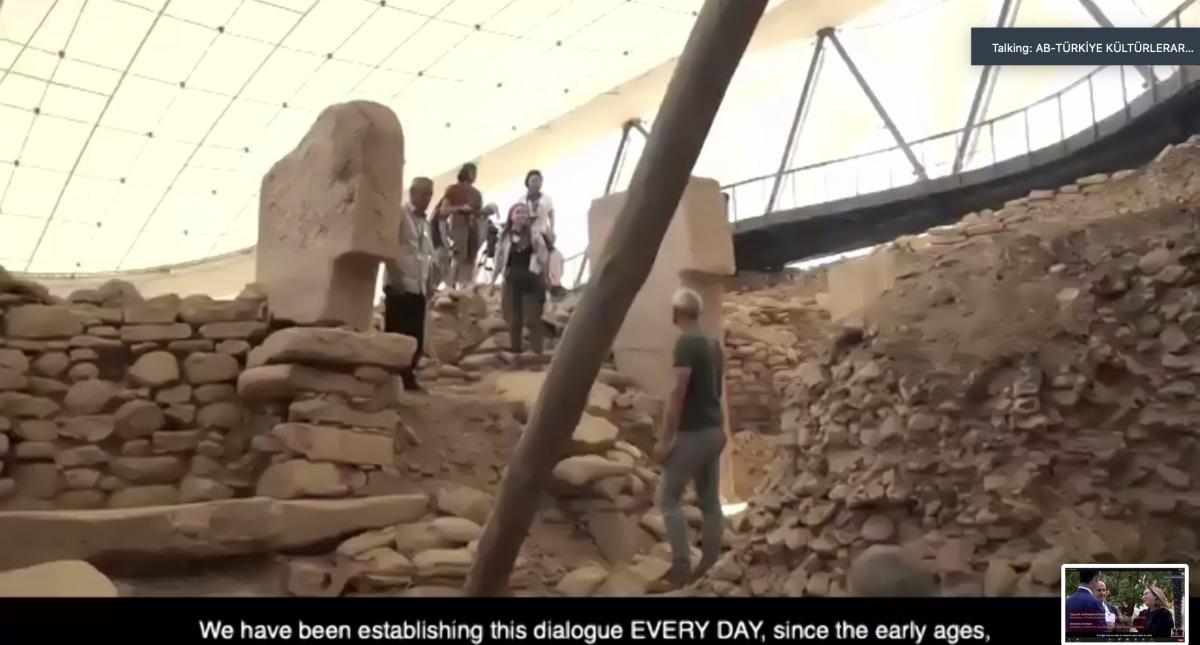
Another supported project was Moving Stones, which created a journey stretching from Anatolia to Europe towards the origins of intercultural dialogue. Together with the French Institute of Anatolian Studies, İMEÇE Association and BABİL Association, they recorded the Neolithic heritage of Anatolia and turned it into a documentary. With the participation of 46 scientists, archaeologists and local people, the project filmed a documentary called the Ancient Story of Anatolia in ruins, museums and laboratories.
Further information on the Moving Stones Project is available in the videos Moving Stones Project in 15 questions
and What did the Moving Stones Project do?.
THE IMPORTANCE OF DIALOGUE IN A MULTICULTURAL SETTING
|
Prof. Öcal Oğuz, Chairman of UNESCO Turkey National Committee |
The Closing Event for EU-Turkey Intercultural Dialogue Program hosted a panel meeting during which cultural interaction and dialogue were discussed from various perspectives. Prof. Öcal Oğuz, Chairman of UNESCO Turkey National Committee, shared his insights on the importance of dialogue against a multicultural setting.
Prof. Oğuz stated that the concept of "building peace in minds" emerged after the two World Wars and was also stipulated in UNESCO Constitution. "The interpretation of this concept goes as follows: Wars first begin in the minds of men, and then comes the action. We first need to build peace in minds. What should be done first? As you know, UNESCO is the educational, scientific and cultural organization of the United Nations. The statesmen and intellectuals of that period thought that education was a very important institution and constructed the following theses: If we increase the number of educated people in the world, we will decrease the emotions that trigger the motivation to engage in war. Therefore, the youth are considered as "ignorant", particularly in our culture in general, since they are less educated and read less, a sense of ignorance as in Neşet Ertaş's lines, 'I was ignorant, and the colors of the world deceived me'. Therefore, they think people who are illiterate will remain ignorant throughout their lives, and thus emphasize education in line with such thought. The first basic slogan of UNESCO is "Education for all."
UNESCO FOCUSES ON INTERCULTURAL DIALOGUE FOR SUSTAINABLE PEACE
Prof. Oğuz stated that, in time, it was concluded that everyone being educated did not prevent wars, and that the United Nations tended towards the concept of "quality education", not just "education for all" to ensure sustainable peace. He explained that UNESCO wanted to strengthen science as the second basis, and thus aimed to create a welfare society. “If we create welfare societies, conflicts will be reduced in such societies. As our ancestors said, 'Welfare brings peace, but poverty causes fights'. UNESCO makes a similar statement through science and welfare." Prof. Oğuz also stated that for people to come into contact with people and to understand each other, UNESCO focused on social sciences as a third area and on culture as a fourth area. “Indeed, the idea that intercultural differences, prejudices and conflicting points threaten peace has emerged as the dominant cause of conflicts. Of course, this can be summarized as not the culture itself but the comments of the carriers carrying the culture. Then, we thought we had to work on culture. But how? We should study both the deeper culture and the superficial culture. But how will they be useful to us? UNESCO thought it would be good to see the innovative, beneficiary, creative design aspect of culture so that it can be used to create and revive welfare. It also considered it useful to benefit from culture to reduce and eliminate our prejudices. So let's tolerate cultures and their representatives. So UNESCO added a fifth area upon all these perspectives. It thought that if we established healthy communication, we could sustain world peace thanks to such healthy communication. Therefore, the ultimate aim of education, positive sciences, social sciences, culture and communication, which can be described as the 5 pillars of UNESCO, is to make peace sustainable. As one of the key factors of making peace sustainable, UNESCO referred to intercultural dialogue, which is the symbol of the metaphor of the convergence of societies."
|
Simon Williams |
Simon Williams, Regional Director for East and South Asia at the British Council, spoke about his organization's approach to intercultural dialogue. Stating that the activities carried out by the British Council were aimed at increasing the soft power of the UK to maintain friendship, trust and cooperation, Williams stated that cultural institutions had experienced some contradictions in the last three decades. Williams said one of these contradictions was the concept of "soft power", because soft power was a larger concept than intercultural relations. Referring to a yet-unpublished study they conducted with 10 EU member states, Williams noted that the study investigated how countries maintained cultural relations. Williams said the research included cultural institutes they supported within the EU. Williams stated the research found that the purpose of soft power was to gain influence for the national interest, but the main goal of intercultural dialogue was to create the necessary conditions for cooperation. Williams stated that cultural institutes sometimes remained in a contradiction on whether to engage in soft power or cultural relations. Williams said that the cultural institutes they interviewed as part of the research reported that the countries that were successful in ensuring soft power and cultural relations had completed steps such as "establishing effective coordination at the national level between all partnerships and ministries, getting involved in civil society, establishing strategic communication in line with the work done, focusing on specific concepts, creating an approach, innovating, and implementing recommendations and shared thoughts for effective cultural relations".
Simon Williams shared his experience on approaches and actors regarding cultural relations over the past two or three decades. Speaking about the activities of the British Council, Williams stated that they used the opportunities presented by culture and arts, and that they attached great importance not only to cooperation in the arts but also to capacity building within creative economy. Indicating that they were a member of EUNIC, Williams expressed that they supported EU programs such as the Intercultural Dialogue Program.
CIVIL SOCIETY ORGANIZATIONS SHOULD BE AN ELEMENT OF INTERCULTURAL DIALOGUE
|
Hüsamettin Koçan |
During the panel, Prof. Hüsamettin Koçan, Founder of Baksı Museum, underlined the contribution of museums which brought together traditional and contemporary arts to dialogue. Underlining the importance of diversity and different experiences in intercultural dialogue, Prof. Koçan stated that he agreed with Edward Said, who said our age was a time when everything was mobile. Stating that it enabled people to move away from their stories and caused them to lose themselves, Prof. Koçan said that intergenerational dialogue was as important as intercultural dialogue. "As someone who has experienced such dialogue in my life, I established the Baksı Museum." Prof. Koçan said that the place where he had been born was very small but still had a rich historical background. A major problem in his hometown was migration. Born in the village of Baksı in Bayburt, Prof. Koçan said, “I am the son of a guest worker who experienced that migration story. Due to a closed society culture and for us to benefit the blessings of new technologies and of the republican administration in Turkey, our father sent me to Istanbul to study. I studied, completed my education, and tried to sustain myself here. Finally, I came across this question: 'So what will my story be?' In the 90s, IKSV had a meeting with Italians on 'intercultural dialogue'. I once uttered such a sentence: 'I came to Istanbul to chase my dreams. Now I will go to where I was born to chase my dreams.' This was because my relations with my place of birth had been disrupted. I forgot it. I just thought there were small nuances in my memory. So I wanted to go back and learn my story again." Koçan indicated that was the start of his dream of the Baksı Museum. "The Baksı Museum was named the best museum in Europe by the Council of Europe in 2014, and I received various awards in Turkey. All these are the confessions of this story of return to myself and this age. In this process of change, we are experiencing contradictions and transformations. That's why we need to perceive intercultural dialogue as interpersonal dialogue”. Prof. Koçan also expressed that a deeper education was required, and that would enable the existence persons who loved diversity rather than marginalizing it. “We have to believe in the uniqueness of the subject we define as 'the Other'. Intercultural dialogue can be established starting from the moment we achieve this."
The Closing Meeting ended with the live screening of the documentary "Ancient Stories of Anatolia", produced under Moving Stones Project, one of the supported projects.
You can find the teaser of the documentary here.

